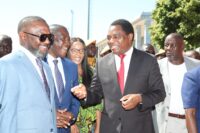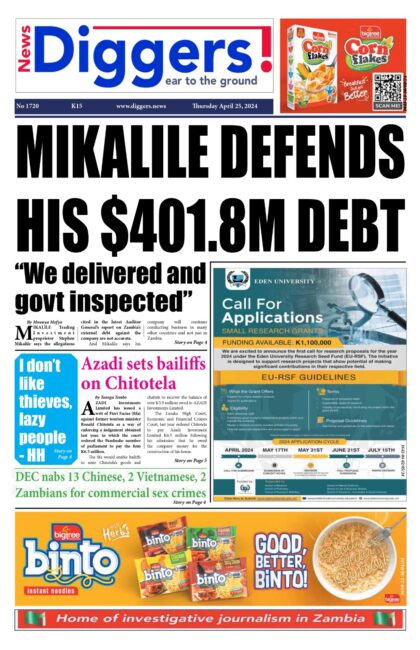Attorney General Likando Kalaluka has argued before the Constitutional Court that allowing the Law Association of Zambia (LAZ) to issue out subpoenas against him and Minister of Justice Given Lubinda without leave of the court, will create unprecedented practice where a party sues someone and summons the same person to testify in its case.
And Solicitor General Abraham Mwansa has submitted that Kalaluka and Lubinda are under oath of office and can only testify before the Constitutional Court when they are authorized by the President.
The State has, therefore, asked the Court to set aside LAZ’s subpoenas against Kalaluka and Lubinda where it wants the two to testify in its petition, challenging government’s attempt to alter the Constitution of Zambia through Bill 10, 2019.
But LAZ has argued that the only people who can challenge the subpoena are those summoned, who in this case are Kalaluka and Lubinda.
In this matter, LAZ has subpoenaed Kalaluka and Lubinda to give evidence on its behalf in relation to what they know about the Constitution (Amendment) Bill 10 of 2019.
In the main matter, LAZ has dragged President Edgar Lungu, Attorney General Likando Kalaluka and the National Assembly to the Constitutional Court for attempting to alter the Constitution of Zambia through Constitution (Amendment) Bill 10 of 2019.
When the matter came up before seven Constitutional Court judges for hearing of the State’s motion to set aside subpoenas on Kalaluka and Lubinda, Wednesday afternoon, Solicitor General Abraham Mwansa submitted that the two subpoenaed witnesses were not competent or compellable witnesses to give evidence unless authorized by the President to transmit any information that they had come across in the discharge of their official duties.
“The two are bound by the principal of confidentiality and they are not at liberty to disclose any information they come across in the course of their duty unless authorized by the President. Such authority ought to be in writing under the signature of the President. The power conferred in the President to allow any officer to give information remain within the discretion of the President and he cannot be compelled to allow the two witnesses to divulge any information they come across in the course of their duty,” he said.
Mwansa further argued that the subpoenas were incompetently before court as no permission of the court was obtained by LAZ to issue the subpoenas.
He added that the summons for subpoenas were also irregular because they did not specify the documents that the witnesses were required to produce.
Mwansa wondered what would happen to Kalaluka’s case when he left the Bar to give evidence in the witness box, since he was the respondent in the matter.
“What would happen to the second respondent’s case when the second respondent is giving evidence? The second respondent would have left the Bar to get to the witness box, who would lead this particular witness? No one,” Mwansa said.
“We reiterate that the subpoenas ought to be set aside because the petitioner did not obtain leave of this court to issue the same. In any case, the requirement for leave enhances the dispensation of justice and promotes accountability in that the court will be given an opportunity to weigh the relevance of the evidence being sought.”
In augmenting Mwansa’s arguments, Kalaluka submitted that allowing the subpoenas without leave of the court would create unprecedented practice where a party sues a defendant and subpoenas the same to aid their case.
Kalaluka, therefore, asked the Court to set aside the subpoenas and that LAZ be condemned in costs.
“Throughout the practice before all the courts in Zambia or, indeed, anywhere else in the whole world, there has never been a case where an applicant sues the respondent and then before the respondent can come up with his case, he calls the same person he has sued to come testify on his behalf, how?” he asked.
“Section 13A requires that before a subpoena is issued, there been an application made to the court. Allowing the petitioner to proceed to just issue subpoenas without any application or leave of the court, will create unprecedented practice where the party suing the defendant and then subpoenas the same defendant to come and testify in the plaintiffs case. Such a scenario will bring this court into disrepute. It’s an abuse of court process.”
But a lawyer representing LAZ, John Sangwa, SC, urged the Court to dismiss the State’s motion to oppose the subpoenas.
He said the respondents had no right to challenge the subpoenas because that right was reserved to the party summoned.
“In this case, the motion to set aside the subpoenas should have been made by the Minister of Justice and Mr Likando Kalaluka as the summoned person,” Sangwa said.
“Furthermore, section 17 in fact gives the Court the power to direct that the witness summoned be paid whatever expenses he or she has incurred in compliance with the subpoena. Our position is, matters of the subpoena are between the person issuing the subpoena and the person summoned.”
Sangwa added that all the arguments about confidentiality, compliance with the State Security Act, were to be raised by the parties summoned not by the respondents.
He said the party summoned should appear before court and tell the Court why he cannot comply with the subpoena, adding that it was the Court to decide whether the person summoned had given good reasons not to be summoned.
“We submit that the respondents have no right to challenge the subpoena,” said Sangwa.
He said a party should be at liberty to prosecute his case as he wishes and call witnesses at his instance without being blocked by the other party.
The Court reserved ruling on the matter to October 30, this year.












